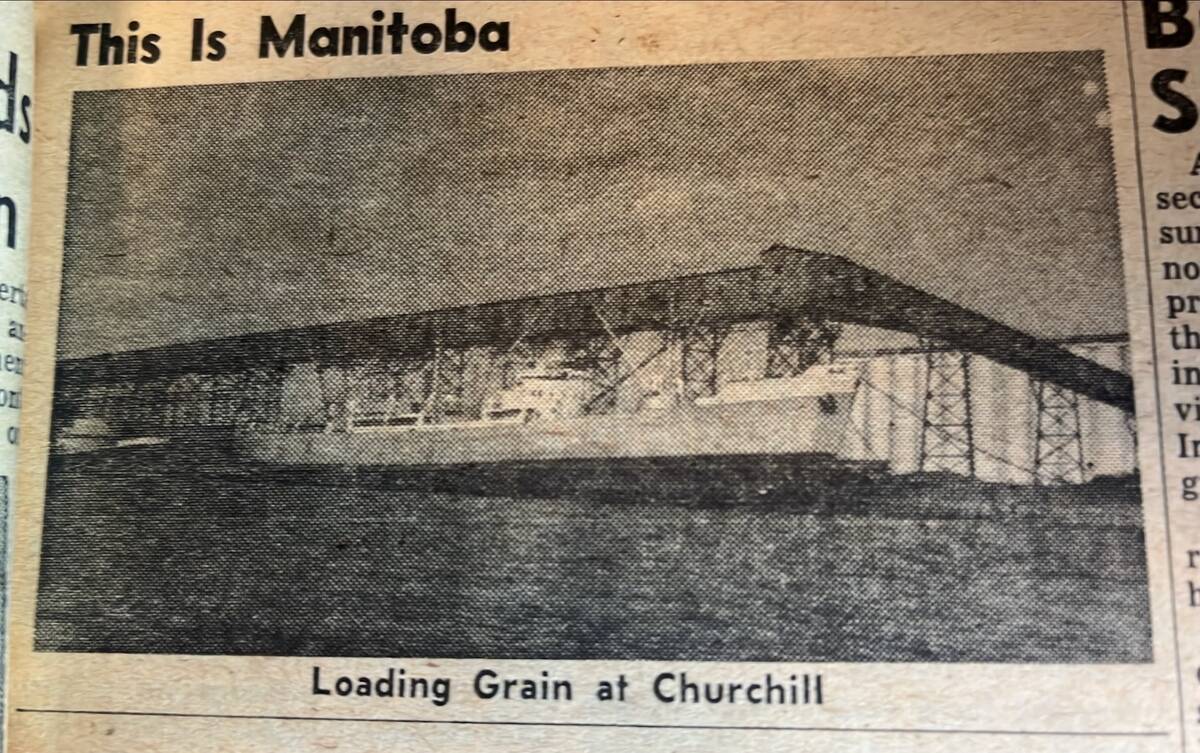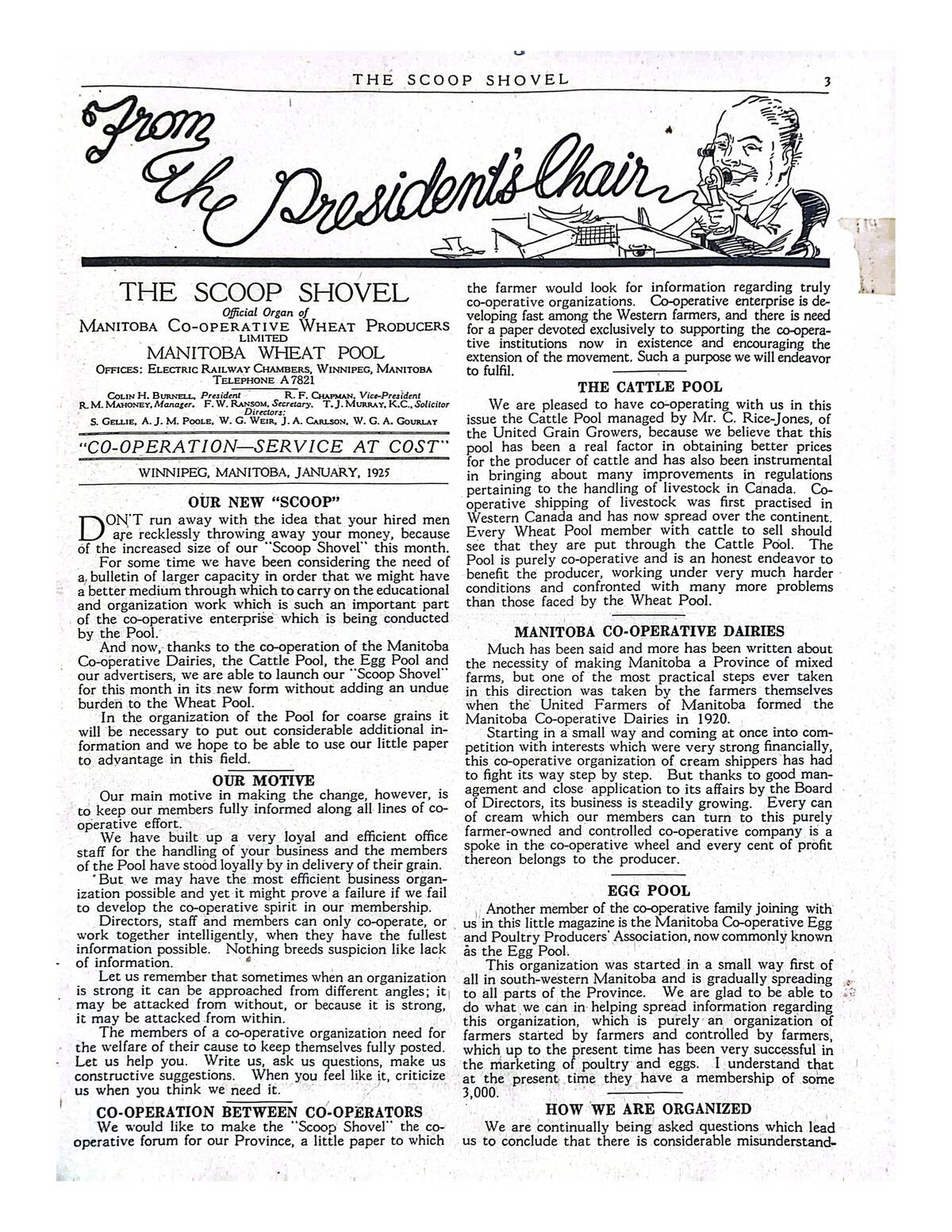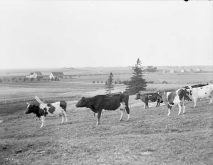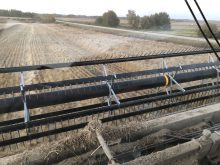Like many Manitoba farm kids growing up in the 1960s, I learned our co-op number about the same time as I was taught to remember our family’s phone number.
While mealtimes tended to be boisterous in our large family, the banter went silent when the daily noon radio broadcast called out the Manitoba Pool Elevator prices. Trips to town were built around visits to the grocery store, hardware or farm supply centre, and the credit union — all operating as co-operatives.
We didn’t think of these enterprises as expressions of collective empowerment. They were just where most farm families of that era bought the goods we needed and delivered the grain that drove the rural Manitoba economy.
Read Also

VIDEO: Manitoba’s Past Lane – Jan. 31
Manitoba, 1946 — Post-war rations for both people and cows: The latest look back at over a century of the Manitoba Co-operator
Most of them are now gone, pushed into obscurity as the agricultural industry and the rural economy modernized, rationalized and consolidated. Some went quietly, simply fading away as better options came along, while others went down fighting, leaving controversy, rifts and bitterness in their wake.
Today, a newcomer could be forgiven for wondering why the province’s flagship farm journal is called the Manitoba Co-operator. It’s a fair question, especially in this era of individual entitlement and siloed algorithms.
However, even though the co-operative business that once owned this publication has long since passed into history, the name still embodies a spirit of co-operation that has sustained the province’s rural community for much of its history.

It surfaced soon after the Selkirk Settlers first arrived in the early 1800s. Indigenous and Metís residents helped them survive those early winters and tried to teach them survival skills based on local knowledge.
The Canadian Encyclopedia credits farmers as the first Canadian group to successfully develop co-operatives, basing them on imported ideals from Europe. The movement was first established in the form of dairy co-operatives in eastern Canada before the idea of banding together to exert market power started to gain momentum in the West.
As the waves of immigrant farmers struggled against formidable odds to “settle” the West, the need arose for “spontaneous co-operation” within the region, writes Ian MacPherson in a Canadian Historical Association article on the history of co-operatives in the Canadian West.
“The settlement process has never been an easy one, but in few areas of the world were the difficulties greater than on the Prairies. The climate was harsh, the agricultural sciences of the time were inadequate, and many of the settlers had no experience with agriculture,” he says.
“More than half of the settlers in fact failed in their efforts to build permanent rural homes and moved on to the cities or left the region. Because of the difficulties, pioneers had to work together, ‘raising’ houses or barns, planting seed, harvesting grain, and overcoming scarcities. This neighbourliness, though not universal, was common and led naturally into more formalized kinds of co-operation.”
Many of those early efforts thrived and then failed in the economic collapse heading into the Great Depression. But those hard times once again reinforced the value people found in working together.
“In the crisis of the Depression, when others sought comfort behind leaders and increased authoritarianism, most co-operators stressed change and development through greater involvement by all citizens,” he writes.
“There were many reasons why co-operative techniques held such strong appeal during these years. They were, for example, one way in which families could join together to meet some of their basic needs for consumer goods. They were also appropriate for groups wanting to organize their own health services, recreation facilities, or community pastures.
“Indeed, in a time when traditional political methods and individual action seemed insufficient, co-operative solutions appeared to be one way in which people could help themselves and their communities.”

Just as following democratic principles was important, so was a commitment to empowering the membership through knowledge.
In the early days, when the isolation and labour intensity of farming meant many farmers obtained only a rudimentary formal education, farm newspapers were a powerful tool for not only reminding co-op members why they belonged, but for keeping them abreast of as new techniques and technologies as well as current events affecting their businesses.
This year marks a century since the Manitoba Co-operative Wheat Producers Ltd., and the Manitoba Wheat Pool began publishing the Scoop Shovel, which later became the Manitoba Co-operator.
The first issue in January 1925 outlines some lofty goals.
“Co-operative enterprise is developing fast among the Western farmers, and there is need for a paper devoted exclusively to supporting the co-operative institutions now in existence and encouraging the extension of the movement,” it says on the front page.
Tucked inside on “The Pool Woman” page, one column over from recipes on how to make a boiled raisin cake, cream of tomato soup and “jugged” rabbit, the editor outlines the wheat pool’s mandate to improve marketing conditions for all farmers in Western Canada. That applied to widows and unmarried farmers’ daughters too.
“It is not a movement launched for the selfish gain of one or two people, but a movement launched by more than 90,000 people for their mutual gain,” it says.

The Scoop Shovel and later the Manitoba Co-operator, along with sister publications such as the Western Producer, over time morphed into a more mainstream focus on the business of farming although their editorial positions have remained supportive of co-operative principles and orderly marketing.
The co-operative institutions and instruments used to achieve those goals have necessarily changed over time. The ways in which farmers co-operate today are vastly different than was the case in the past.
History has shown that hard times can either bring people together or drive them apart. It has also shown repeatedly that communities can achieve more, much more, by working together.
It doesn’t have to be through a formal business or institution. It can be a coalition around a common issue an event or standing up to a common foe. And their chances of success are amplified if they are operating from a foundation of knowledge.
From that vantage point, the Manitoba Co-operator remains as relevant as ever.
















